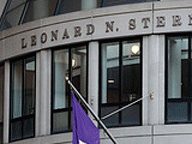Faculty News
—
Prof. Aswath Damodaran on Facebook's purchase of WhatsApp
—

Excerpt from the Los Angeles Times -- "It isn't 1999, but companies with loads of users — but few prospects for making money — are being handed lofty market values, said Aswath Damodaran, who teaches corporate finance and valuations at New York University's Stern School of Business."
Faculty News
—

Excerpt from the Los Angeles Times -- "It isn't 1999, but companies with loads of users — but few prospects for making money — are being handed lofty market values, said Aswath Damodaran, who teaches corporate finance and valuations at New York University's Stern School of Business."




















